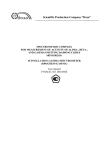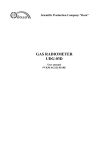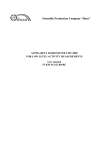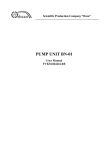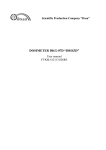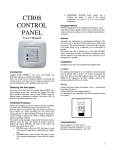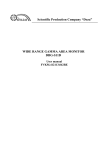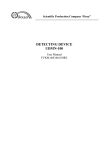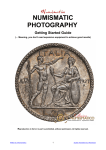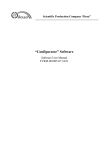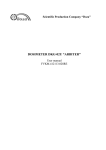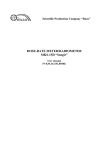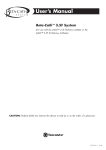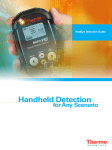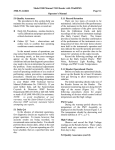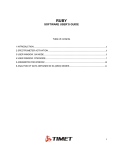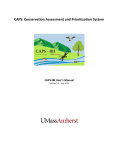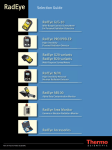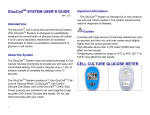Download User Manual
Transcript
Scientific Production Company “Doza” SPECTROMETRIC COMPLEX FOR MEASUREMENT OF ACTIVITY OF ALPHA-, BETA-, AND GAMMA-EMITTING RADIONUCLIDES «PROGRESS» SCINTILLATION BETA-SPECTROMETER «PROGRESS-BETA» User manual FVKM.412131.002-02RE Cont ent 1 Description and operation of the product …………………………………………… 1.1 Product functionality ……………………………………………..…….…….. 1.2 Technical characteristics ……………………...………………….…………... 1.3 Configuration ………….……………………...……………………..………... 1.4 Design and operation ……………………….……………………..………….. 1.5 Marking and sealing……………………………………………...…………… 1.6 Packing ………………………………………………………………….……. 2 Intended use ………………………………………………………………………… 2.1 Operating limitations ……………………………………………………….… 2.2 Preparation of the product for use ….…………….…..………………...…….. 3 Maintenance ……………………………………………………….………………... 3.1 General notes …….………………………………………………………....… 3.2 Safety precautions ……………………………………………………………. 3.3 Maintenance routine ……………………………………...………………..…. 4 Calibration routine ………..……………………….…………………….……….….. 4.1 General requirements …………………………………………………….….... 4.2 Preliminary arrangements …………………………………………..…...……. 4.3 Safety precautions ……………………………………………………..…..…. 4.4 Conditions …………………………………….…………………………….... 4.5 Procedure ……………………………………………………..…………….… 5 Routing repairs ……………………………………………………………..……….. 6 Storage ………………………………………………………………….….………... 7 Transportation ………………………………………………………………….…… 8 Disposal ………………………………………………………………….….…...….. 3 3 3 4 4 5 5 5 5 5 6 6 6 6 7 7 7 7 7 7 10 10 10 10 Appendix A Assembling of beta-spectrometer …………………………………………... 12 Appendix B Connection layout ……………..…..………………………………………... 13 FVKM.412131.002-02RE 2 This user manual FVKM.412131.002-02RE contains information on design, principle of operation, characteristics of the scintillation beta-spectrometer «Progress» and instructions essential for correct and safe use of this product (intended use, maintenance, servicing, storage and transportation), as well as information regarding the utilization of the product. 1 DESCRIPTION AND OPERATION OF THE PRODUCT 1.1 Product functionality Scintillation beta-spectrometer «Progress-beta» FVKM.412131.002-02 (hereinafter – betaspectrometer) represents a part of a spectrometric complex «Progress» for measurement of activity of alpha-, beta-, and gamma-emitting radionuclides and can be used independently. Beta-spectrometer is intended for measurement of activity of beta-emitting radionuclides in samples of the foodstuffs, samples of biological origin, water and soil samples, and other environmental samples in the laboratory. Beta-spectrometer can be used for radiation monitoring at nuclear plants, at the enterprises and facilities which produce or use sources of ionizing radiation. 1.2 Technical characteristics 1.2.1 Energy range …………….…..…….…..……..…….…..….…….…..….. 200 to 3000 keV. 1.2.2 Measurement range of specific activity of 90Sr in a sample weighted 10 g placed in a standard planchet: - with presence of 40К in a sample with activity up to 5 Bq/g ….......... from 100 to 106 Bq/kg; - without presence of 40К in a sample ……………………………….… from 50 to 106 Bq/kg. 1.2.3 Highest possible count rate in the measurement channel .……………….…...… 5104 cps. 1.2.4 Limits of the permissible basic relative error of measured activity ……………..… ±10 %. 1.2.5 Relative energy resolution ...…...…...…...…...……………………………....…..…. 20 %, at peak of conversion electrons with energy 624 keV. 1.2.6 Integral non-linearity of the conversion characteristic ………………………...…..…. 5 %. 1.2.7 Warm-up time ………….…….….…….…..………….…….….………….……… 30 min. 1.2.8 Continuous operation ……….……………...…..…...……………..…...….……… 8 hours. 1.2.9 Instability during 8 hours of continuous operation ……….……..………....…..…… ±2 %. 1.2.10 Power supply of the PC from mains power supply ………...….....… (220 25) V, 50 Hz. 1.2.11 Power consumption (including PC) ….….….…………..……………….....….... 400 VA. 1.2.12 Power consumption of the measurement channel …….……...………………..... 0.5 VA. 1.2.13 Microclimatic factors of the environment during operation of the beta-spectrometer: - operating temperature range …………………………………………… from +10 to +40 °C; - relative humidity …………..………………..………………..…..……up to 98 % at +35 C; - atmospheric pressure range ……………………………..……….… from 84.0 to 106.7 kPa; - content of the corrosive agents in the ambient air corresponds to the values in table 1.1. Table 1.1 Type of atmosphere Content of the corrosive agents Designation Description Sulfur dioxide gas no more than 20 mg/(m2·day) I Relatively clean (not more than 0.025 mg/m3); Chlorides not more than 0.3 mg/(m2·day) Sulfur dioxide gas no more than 20 to 250 mg/(m2·day) (not more than 0.025 to 0.31 mg/m3); II Industrial Chlorides - not more than 0.3 mg/(m2·day) FVKM.412131.002-02RE 3 1.2.14 Casings of the beta-spectrometer ensure protection against penetration of solid objects and water in accordance with the IP23. 1.2.15 Beta-spectrometer withstands electromagnetic interference in compliance with the IEC 1000-4-8-93, IEC 1000-4-9-93, IEC 61000-3-2-95, IEC 610003-3-94, IEC 61000-4-2-95, IEC 61000-4-3:2006, IEC 61000-4-4-95, IEC 61000-4-5-95, IEC 61000-4-6-96, IEC 61000-4-11-94, IEC 61000-4-12-96, IEC 61000-4-13:2002, IEC 61000-4-14-99, IEC 61000-4-28-99, design group III, performance criterion А. Electromagnetic interference does not cause false triggering and restart of the measurement channel. 1.2.16 With regard to seismic stability the beta-spectrometer stability against earthquake intensity 7 according to the MSK-64 scale at 30 m relative to the grade level. 1.2.17 With regard to protection against electric shock beta-spectrometer is classified as class I according to the IEC61010-1:2001. 1.2.18 With regard to fire-prevention characteristics beta-spectrometer complies with fire probability of no more than 10-6 year-1. 1.2.19 Beta-spectrometer withstands the exposure to decontaminating solutions: - first solution - caustic soda 50 - 60 g/l, potassium permanganate 5 - 10 g/l, - second solution - oxalic acid 20 - 40 g/l, - third solution - detergents, - 5 % solution of the citric acid in the rectified ethyl alcohol for handling electronic devices. 1.2.20 Shielding weight ……….……………….….….…………….…………………..... 30 kg. 1.2.21 Overall dimensions of the shielding …….….………………..…...… 220×190×160 mm. 1.3 Configuration 1.3.1 Beta-spectrometer is a stationary unit with scintillation detector unit, personal computer and software «Progress» intended for control in all modes of operation and all steps of the measurement process, for processing of measurement data and recording results. 1.3.2 Beta-spectrometer includes: combined into single case: scintillation detector block with plastic scintillator, power supply unit and pulse amplifier, analog-to-digital converter (ADC), counting sample holder and lead shielding block for shielding of natural background radiation. Power supply units and pulse amplifiers as well as ADC are placed directly in the detector block. Standard planchets are used for measurement of counting samples. 1.3.3 Calibration source 90Sr(Y) on a special disk for placing the source in measurement position, included in the delivery kit, is intended for performing energy calibration and regular checks of stability of beta-spectrometer parameters. 1.4 Design and operation 1.4.1 Mode of operation of the beta-spectrometer is based on acquisition of apparatus spectrum of pulses from detector, which detects radiation emitted from the counting sample exposed under fixed measurement conditions. Activity of a radionuclide in the sample is determined by means of spectrogram processing in the personal computer using the «Progress» software. 1.4.2 The «Progress» software allows controlling the beta-spectrometer operation, analyzing spectrogram and identifying radionuclides, determining activity of corresponding nuclides in the sample, computing measurement error, and registering measurement results. FVKM.412131.002-02RE 4 1.5 Marking and sealing 1.5.1 A label should be attached to the products which constitute beta-spectrometer with the following designations: - trade mark and name of the manufacturer; - designation of the product: product type, unit; - works number of product or unit according to the manufacturer's system of numeration; - year of production; - degree of ingress protection provided by casings; - made in Russia. 1.5.2 Place and method of marking of the products which constitute beta-spectrometer should comply with the design documentation. 1.5.3 All products which constitute beta-spectrometer should be sealed in accordance with design documentation. 1.6 Packing 1.6.1 Packing meets the design documentation and provides protection against penetration of atmospheric precipitation and aerosols, splashing water, dust, sand, solar ultraviolet radiation and limits the penetration of water vapor and gases. 2 INTENDED USE 2.1 Operating limitations 2.1.1 Beta-spectrometer shall be stationary installed in the laboratory room where normal conditions of operation are ensured. There are no special requirements for the room where the betaspectrometer is installed. 2.1.2 Scintillation detector unit with shielding shall be mounted in a location within a room where the possibility of vibrations is minimal (closer to a corner or a wall of the room). The laboratory bench has to be placed so as to exclude problems with connecting units to the wall outlets and to the protective earth terminals. It is recommended to place the monitor so as not to expose its screen to the direct sun light and to ensure protection in the place where the detector is located. 2.1.3 Beta-spectrometer should be used in rooms where increasing of the natural background is not possible. 2.1.4 Beta-spectrometer has to be used in rooms where the presence of constant and/or alternating magnetic fields with strength more than 40 A/m is excluded. 2.1.5 Servicing of the beta-spectrometer does not require participation of specially trained personnel. 2.2 Preparation of the product for use 2.2.1 Assemble the beta-spectrometer consulting with the assembling diagram in the Appendix A. 2.2.2 Connect cable of the detector unit to the USB port of the personal computer in accordance with the wiring diagram in the Appendix B. When connecting several detector units of the complex «Progress» to the same PC, units are connected independent of each other to vacant USB ports. Use USB splitter if necessary. 2.2.3 Turn on the PC. Warm up the beta-spectrometer for 30 minutes. 2.2.4 Start the «Progress» software by clicking on the corresponding icon on the desktop. FVKM.412131.002-02RE 5 2.2.5 Detailed description of steps during operation of the beta-spectrometer is presented in the following documentation that comes with spectrometer: - Procedure for performance testing of the spectrometric complex «Progress» for activity measurement of alpha-, beta-, and gamma-emitting radionuclides (beta-channel); - Procedure manual for measurement of activity of radionuclides using the scintillation betaspectrometer «Progress» with software «Progress»; - Software for complexes «Progress» for spectrometric and radiometric measurements. User manual. 3 MAINTENANCE 3.1 General notes 3.1.1 Maintenance of the beta-spectrometer shall be performed with the purpose of ensuring operability during all life time. Types and terms of maintenance are shown on the section 3.3. 3.1.2 Performance testing is carried out during annual calibration of the beta-spectrometer in accordance with the procedure described in the section 4. 3.1.3 Safety measures indicated in the section 3.2 should be followed during maintenance of the beta-spectrometer. 3.2 Safety precautions 3.2.1 All work associated with the operation must be performed in accordance with instructions for safety and radiation safety applicable in the enterprise. 3.2.2 Maintenance of the beta-spectrometer is carried out by persons: - trained in operation of radiometric and spectrometric instrumentation; - having permission for work with high voltage supplies; - having permission for work with sources of ionizing radiation. 3.2.3 When performing work one should pay special attention to condition of the power cord and power switch – dangerous voltages can be present in that locations. 3.3 Maintenance routine Maintenance is divided into routine and periodic. 3.3.1 Routine maintenance Routine maintenance is carried out during regular operation of the beta-spectrometer; it includes daily dust removal from outer surfaces and measuring beta-radiation background. Upon increasing of the beta-radiation background perform decontamination of outer surfaces of the detector unit and inner surfaces of the lead shielding. It is also necessary to wipe measuring planchets using a pad moisten with ethyl alcohol after each measurement. Ethyl alcohol consumption is 50 g per 10 samples. It is necessary to inspect connecting cables, switches and connectors, wipe leads of plugs and sockets with ethyl alcohol (total ethyl alcohol consumption - 150 g). 3.3.2 Periodic maintenance Periodic maintenance includes check of the technical condition of the beta-spectrometer; it shall be performed on a regular basis, at least once a month. The check is performed by means of measurement of a count rate from calibration sources using specified mode of operation of the spectrometer. Technical condition of the beta-spectrometer is considered acceptable in case the deviation of the measured count rate from the reference count rate indicated in the certificate of calibration does not exceed 10 %. FVKM.412131.002-02RE 6 4 CALIBRATION ROUTINE 4.1 General requirements 4.1.1 Calibration of the beta-spectrometer is performed in accordance with IEC 61453:2007. 4.2 Preliminary arrangements 4.2.1 Operations that should be performed during calibration and required equipment are listed in the Table 4.1. Table 4.1 - List of calibration operations Operation Section 1 External examination 2 Testing 3 Determination of metrological characteristics 4.5.1 4.5.2 4.5.3 4 Processing of results 4.5.4 Calibration equipment and its characteristics Visual Calibration source 90Sr(Y) (included in the delivery kit of the beta-spectrometer). Working standard 1 SO with activity 100 - 500 Bq. PC. Software «Progress» Not e - It is acceptable to use other calibration equipment with characteristics that ensures determination of metrological parameters with required precision. 4.3 Safety requirements 4.3.1 It is necessary to follow safety requirements described in section 3.2 and in documentation accompanying calibration tools and equipment. 4.4 Conditions 4.4.1 The following normal operating conditions shall be met during calibration: - air temperature ………………...………………………………………………. +(20 ±5) °C; - relative air humidity ……….………………………….....….…...……...… from 30 to 80 %; - atmospheric pressure ……………………………………….………….… 86.0 to 106.7 kPa. 4.4.2 Operations conducted with calibration facilities and beta-spectrometer under test shall comply with guidelines detailed in relevant operation manuals. 4.4.3 Before switching the beta-spectrometer on and performing the calibration keep it in conditions specified in 4.4.1 for 4 hours. 4.5 Procedure 4.5.1 External examination The following should be confirmed during the external examination: - completeness of the delivery kit; - presence of operational documentation; - absence of defects affecting the operation of beta-spectrometer. 4.5.2 Testing Turn the beta-spectrometer on (computer and power supply unit) and wait until warming up for 30 minutes. Start «Progress» software and initiate viewing mode of the apparatus spectrum of betaspectrometer. Insert the calibration source 90Sr(Y) in standard position and start measurement in the energy calibration mode in accordance with the user manual for the software «Progress». A live spectrum will appear on the screen, typical shape of the spectrum is shown in the Figure 4.1. FVKM.412131.002-02RE 7 Figure 4.1 – Apparatus spectrum of the 90Sr(Y) source measured by beta-spectrometer 4.5.3 Determination of metrological characteristics 4.5.3.1 Measurements of the calibration source 1) Place the calibration source 90Sr(Y) in the detector unit for performing energy calibration. 2) Start measurement in the energy calibration mode. During measurement process the software shows on the screen positions (channel numbers n1 and n2) determined from the calibration source spectrum (these positions correspond to boundary values of apparatus beta-spectra of radionuclides 90 Sr and 90Y: 540 and 2280 keV, accordingly) and the test count rate within energy range from 250 to 500 keV. 3) After 150 seconds make a record in the row 1 of the Table 4.2. In the columns «Reference mark 540 keV» and «Reference mark 2280 keV» channel numbers are to be recorded corresponding to the boundary values of the apparatus spectra, and in the column «Test count rate» – the value of measured test count rate. Table 4.2 – Results of the energy calibration by source 90Sr(Y) Number of Test count rate Reference mark 540 keV Reference mark 2280 keV measurement 4) Perform at least five successive measurements of calibration source and record the results into the rows of the table 4.2. 4.5.3.2 Measurements of background 1) Remove calibration source out of the detector unit and start spectrum acquisition in the background measurements mode. During measurement the software shows on the screen values of the background count rate in the current and previous measurements. 2) In case that the difference between current and previously measured count rates in at least one of the checked intervals exceeds the criterion preset in the software, it will warn the user about change of the background spectrum. If this is the case, eliminate the reason of increased background and perform two successive measurements of background in accordance with step 1) above. In case that during the last background measurements a high background warning will appear again, results of the calibration should be considered negative with the wording «instability of the background readings». It is recommended to dispatch beta-spectrometer for repair. 3) Provided that background change warning does not appear upon completion of acquisition of the background spectrum (3600 seconds), record the results of background measurements in the Table 4.3. FVKM.412131.002-02RE 8 Table 4.3 - Results of background measurements 1 Count rate in the energy intervals, cps 2 3 4 Measured background spectrum Previously measured background spectrum 4.5.3.3 Measurement of the working standard activity 1) Perform energy calibration in accordance with section 4.5.3.1 and record results in the table 4.2. 2) Remove calibration source out of the detector unit and place working standard 1SO instead. 3) Start acquisition of the spectrum in the activity measurement mode by selecting a task «MEASUREMENT OF Sr(Y)90 ACTIVITY». Record measured activity values (specific activity) and uncertainty of measurement results for the Sr(Y) working standard used in the Table 4.4 together with reference activity of this standard indicated in the calibration certificate (after correction for decay). Table 4.4 - Results of activity measurements (specific activity) of the working standard Radionuclide Measured activity (specific activity) Uncertainty Reference activity 4.5.4 Processing of results 1) Calculate the mean value of five measured results obtained with calibration source (see 4.5.3.1). 2) Calculate the mean value of measured activity of the working standard (see 4.5.3.3). 3) Calculate relative measurement error of the working standard activity by the following formula 0 100 , 0 (4.1) where А0 – activity of the working standard 1SO indicated in the calibration standard (after correction for decay), Bq; - mean value of measured activity of the working standard, Bq. Calculate limits for the basic relative error of activity measurement in percents by the following formula 1,1 O2 2 , (4.2) where o - uncertainty of the working standard (indicated in the calibration certificate for the standard), %. Calibration results are considered positive if the value of the basic relative of measurement error does not exceed limits stated in the section 1.2.4. FVKM.412131.002-02RE 9 5 ROUTING REPAIRS 5.1 Defective detector units of the beta-spectrometer are to be replaced or repaired by the manufacturer. 6 STORAGE 6.1 Before putting into operation beta-spectrometer shall be stored in the heated and ventilated warehouse: - in manufacturer’s package at ambient temperatures from +5 to +40 С and relative humidity up to 80 % at +25С; - unpacked under conditions at ambient temperatures from +10 to +35 С and relative humidity up to 80 % at +25 С; 6.2 The storage location should be free of dust, chemical vapours, aggressive gases and other substances that may cause corrosion. Beta-spectrometer should be kept away from direct sunlight. 7 TRANSPORTATION 7.1 Beta-spectrometer in the original package of the manufacturer can be transported by all means of transport at any distance: - transportation by rail should be carried out in clean boxcars; - during transportation in the open motor transport boxes should be covered by the waterproof material; - during transportation by air boxes should be placed in airtight heated compartment; - during maritime and river transportation boxes should be placed in the hold. 7.2 Arrangement and fastening of boxes on all means of transport have to ensure stable condition during transportation, absence of relocation and shocks resulted from collisions with each other. 7.3 It is necessary to follow the requirements indicated on the package during loading and unloading. During loading and unloading the beta-spectrometer should not be exposed to atmospheric precipitations. 7.4 Transportation conditions: - temperatures ……………………………….………………..…… from minus 50 to +50 C provided a smooth thermal stabilization is ensured at unloading to temperatures from minus 10 to +40 С and subsequent storage under normal conditions during 24 hours; - humidity ………………………...………………..……….……....….. up to 98 % at +35 °C; - sinusoidal vibrations ……………..……........…. in the frequency range from 10 to 55 Hz with displacement amplitude 0.35 mm. 8 DISPOSAL 8.1 After a full life of beta-spectrometer (products included in its composition), before sending it for repairs or for calibration should conduct a survey products for the presence of radioactive contamination of surfaces. Criteria for deciding on the cleanup and future use are taken in accordance with the mandatory requirements of national standards. 8.2 Decontamination should be carried out with solutions in accordance with 1.2.20, in cases where the level of radioactive contamination of surfaces products (including accessible for repair) can be reduced to acceptable values. FVKM.412131.002-02RE 10 8.3 The product for which the permission was granted for further use after decontamination is subject for repair or replacement in case of malfunction. Beta-spectrometer unsuitable for operation, with radioactive contamination levels below permissible values, should be dismantled to prevent its further use and transferred to a special site for disposal of industrial wastes. 8.4 Product with expired intended life time, which is considered suitable for further use after decontamination, shall be inspected for proper technical state. In case of satisfactory technical state, extended operation term of the product shall be determined. FVKM.412131.002-02RE 11 Appendix A (mandatory) ASSEMBLING OF BETA-SPECTROMETER Detector Ring Shielding FVKM.412131.002-02RE 12 Appendix B (mandatory) CONNECTION LAYOUT Function of USB port contacts PIN # SIGNAL 1 +5 2 - Data 3 + Data 4 GND А1 USB А2 220 V, 50 Hz Position Item Q-ty А1 Detector unit BDEB3-2U 1 А2 System unit of the PC 1 FVKM.412131.002-02RE 13 Note













